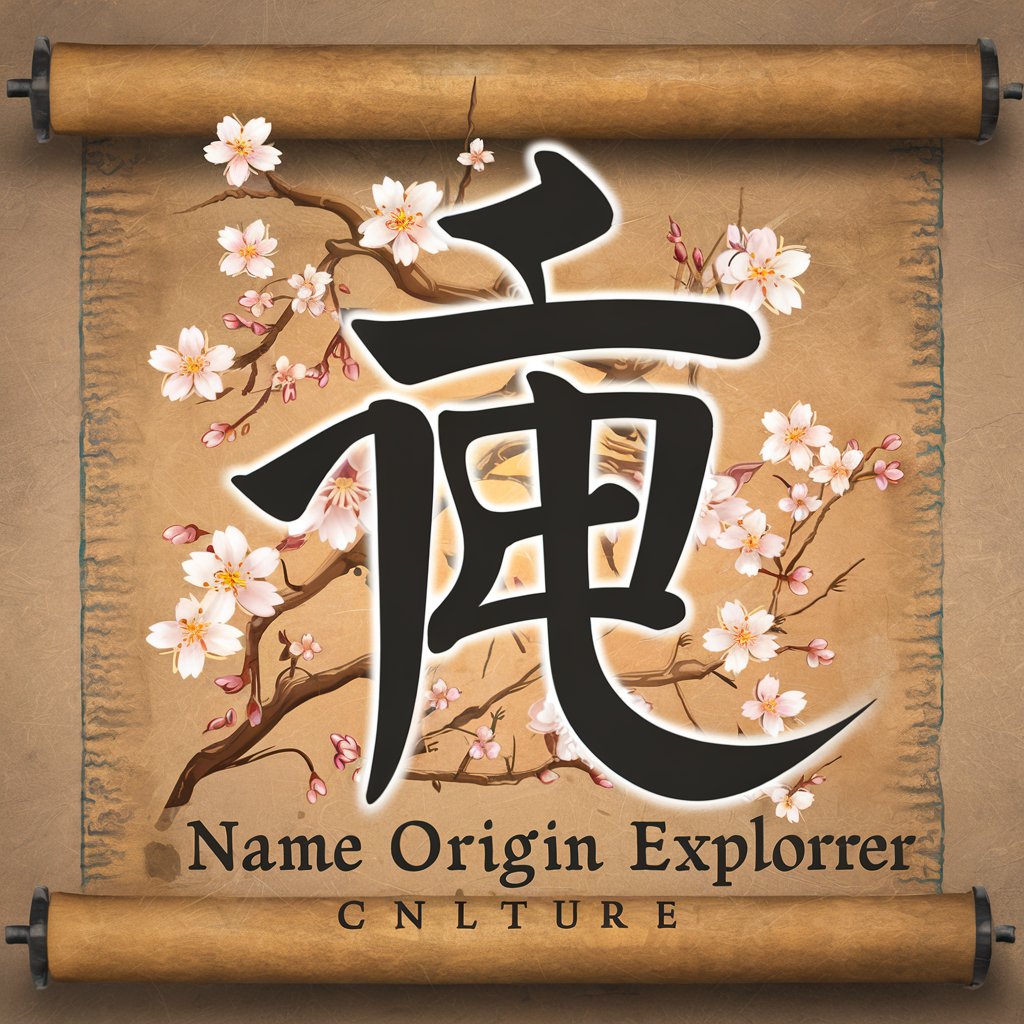
名前由来GPT - Japanese Name Origins Exploration

こんにちは!日本の名前の由来について学びましょう。
Discover the story behind every name
Explain the origin and meaning of the Japanese name
What is the historical background of the name
Can you tell me the cultural significance of the name
Provide details on the etymology and usage of the name
Get Embed Code
Introduction to 名前由来GPT
名前由来GPT, or 'Name Origin Explorer', is a specialized AI designed to delve into the origins and meanings behind Japanese names. Its primary focus is on providing educational insights into the etymology, cultural significance, and historical background of names within the Japanese context. This GPT distinguishes between personal names, geographical names, and historical names, offering a wide range of information from traditional meanings to modern interpretations. An example scenario might involve explaining the origin of the name 'Yuki' (雪), highlighting that it means 'snow' in Japanese, and discussing its popularity and cultural associations, such as purity and tranquility. The purpose of this GPT is not only to interpret names but also to enrich users' understanding of Japanese culture and history through names, blending linguistic analysis with cultural storytelling. Powered by ChatGPT-4o。

Main Functions of 名前由来GPT
Etymological Analysis
Example
Explaining that 'Sakura' (桜) means cherry blossom and discussing its significance in Japanese culture.
Scenario
A user curious about the cultural importance of cherry blossoms in Japan and how this is reflected in the name 'Sakura'.
Cultural Significance Explanation
Example
Delving into the name 'Kenji' (健二) to explore its meanings like 'healthy, strong' and 'two', and how these reflect broader societal values.
Scenario
A parent looking for a meaningful name for their child, wanting to understand not just the meaning but also the cultural values it represents.
Historical Context Provision
Example
Discussing the origins of the place name 'Edo' (江戸), the former name of Tokyo, and its transformation over time.
Scenario
A student researching the historical development of Tokyo and the significance of its names through different eras.
Ideal Users of 名前由来GPT Services
Students and Educators
Individuals engaged in studies or teaching of Japanese language, history, or culture will find this tool invaluable for understanding the etymological and cultural layers behind names, enriching their educational materials and discussions.
Writers and Creators
Those in creative fields, such as authors or game developers, seeking authentic and meaningful Japanese names for characters, locations, or concepts in their work will benefit from the detailed insights and historical context provided.
Individuals Exploring Heritage
People of Japanese descent or those interested in exploring their own or their family's name origins will find a rich source of information in this tool, connecting them with their cultural and historical roots.

How to Use 名前由来GPT
Step 1
Start by visiting yeschat.ai for an opportunity to explore 名前由来GPT with a free trial, no login or ChatGPT Plus subscription required.
Step 2
Input your question or request regarding the origins and meanings of Japanese names directly into the chat interface.
Step 3
Specify if you prefer responses in English or Japanese to ensure the information is presented in your preferred language.
Step 4
For more accurate and detailed information, provide as much context as possible regarding the name you're inquiring about, such as its usage (personal, geographical, historical) or any specific characters (kanji) involved.
Step 5
Review the provided information, and feel free to ask follow-up questions or for clarifications on any points of interest.
Try other advanced and practical GPTs
文章変換:三島由紀夫
Revive prose with Mishima's fervent essence.

農家のお米がおいしい理由
Discover the essence of traditional rice farming, powered by AI.

哄女友助手
Enhance your relationship with AI wisdom.

初级闯关作业批改助理
Empowering junior consultants through AI-driven feedback.

劳动经济学闯关小游戏
Interactive AI-powered labor economics learning.

文本纠错大师
Elevate Your Writing with AI Precision

自由研究アイデア生成AI
Empowering your research with AI-driven insights.

PretextPro~その理由、考えます~
Crafting Excuses with AI Creativity

中文 -- English | Chinese -- 英文
Seamless AI-powered language translation

糖尿病咨询专家
Empowering Diabetes Awareness with AI

講談糖尿病 (ChatDiabetes Pro)
Empowering diabetes management with AI

小糖
AI-powered diabetes care and guidance

Detailed Q&A about 名前由来GPT
What kind of names can 名前由来GPT analyze?
I specialize in the origins and meanings of Japanese names, covering personal names, geographical names, and historical names, along with the etymological background of specific kanji characters used in these names.
Can 名前由来GPT provide information on name popularity trends?
While my primary focus is on the historical and cultural significance of names, I can offer insights into the popularity trends of certain names based on historical data and cultural contexts.
How does 名前由来GPT ensure the accuracy of its information?
I rely on credible sources for information on name origins and meanings, distinguishing between well-established facts and interpretations, and clearly stating when information is uncertain or unavailable.
Can 名前由来GPT help with creating a name?
Yes, based on the cultural and etymological insights I provide, users can gain inspiration for creating names that are meaningful, culturally respectful, and linguistically appropriate.
Does 名前由来GPT support inquiries about non-Japanese names?
While my expertise is in Japanese names, I can provide general guidance and historical context for non-Japanese names to a certain extent, particularly those that have influenced or been influenced by Japanese culture.





